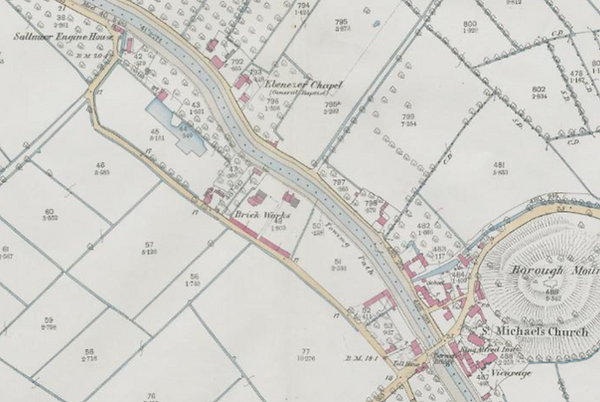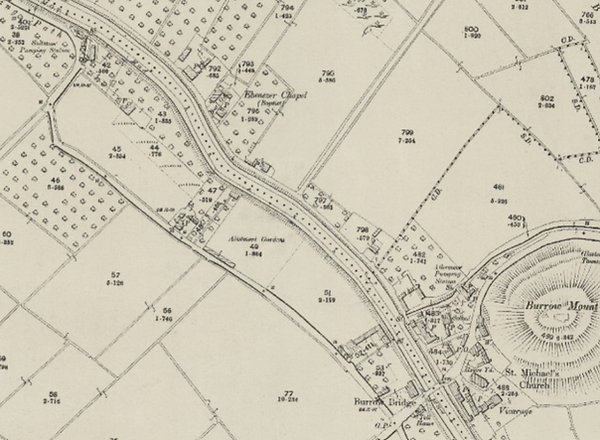STOKE SUNDAY HISTORY SPOT
Investigating the Past, to Understand the Present, to Plan for the Future
Click HERE for Main History Site
Burrowbridge Brick Works
Local clay,dug from near the Rivers Parrett and Tone had been used for making bricks from mediaeval times, but by the late 17th century, brick and tile manufacture was common across the Somerset Levels, thanks to extensive alluvial clay deposits. Small‐scale yards often sprang up near villages to supply local building needs, and Burrowbridge was one of those villages, but for much of the 19th and 20th centuries, the brick and tile industry provided the financial backbone to the town of Bridgwater.
The hand-made bricks from the 18th Century sites can still be seen in Friarn Street, Dampiet Street and St Mary Street. More yards sprang up along the river as the demand increased and, by the end of the eighteenth century, brick making was recognisable as an industry. As demand began to arrive from further afield brickyards sprang up from Burnham-on-Sea to Burrowbridge, where one was built on the site of the present Village Hall.

On Saturday 2nd June 1866, the Langport & Somerton Herald reported: “BOROUGH BRIDGE, In the Parish of Stoke St. Gregory, Somerset. Highly Valuable Freehold Brick and Tile Yard, and Premises adjoining the River Parrett. To be Sold by Auction by MR. MORRIS, at the King Alfred Inn, at Borough Bridge aforesaid, on MONDAY, 4th June next, at Six o'Clock in the Evening, subject to such conditions of sale as shall then be produced, and in the following or such other lots as shall be named at the time of sale, the undermentioned very valuable Arable and Orchard LANDS, with the newly brick-built DWELLING-HOUSE, and Premises, namely : Lot 1—All that most superior close of Arable Land called the "Corner Piece," on which a Brick and Tile Yard has recently been established, with the newly-erected Kiln thereon, containing by estimation 3a. Ir. 21p. (more or less), situate adjoining the River Parrett and Public Road, near the Saltmoor Engine House, at Borough Bridge aforesaid, with the Jetty and Burrow Road leading to the River for delivering Goods, etc. The above Land contains an almost inexhaustible bed of the finest clay, from which first class Red Ware Goods of all descriptions can be produced; this peculiarly fine soil for pottery goods, combined with its excellent aituation, being near the Athelney and Durston Railway Stations, offers an unusual opportunity for carrying on a large and lucrative business. The Plant, which is nearly new, may be taken at a valuation in the usual manner. LOT 2—All that newly-erected and most comfortable brick built Dwelling House, Barn, Stable, Outbuildings, Walled Garden and Orchard adjoining, containing about half-an-aerc more or loss, situate adjoining lot 1, and facing the Public Road, leading from Borough Bridge to Bridgwater. The House contains 5 bedrooms, parlour, kitchen, back kitchen, cellar, covered shed with a pump and soft water cistern. The Orchard is in full bearing, and the Land consists of a most productive soil of great strength and fertility, and will be sold in fee simple. To view apply to Mr. EZEKIEL MEADE, the present occupier and owner."
Although Ezekiel Athenasius Meade was named as owner, In 1865 the question had to be answered: “CAN A FELON KEEP A BEER HOUSE?" The Taunton courier reported: "Ezekiel Meade of Stoke St Gregory was charged at the instance of the police with keeping a house for the sale of beer and cider, he having been convicted of felony. Meade was once the proprietor of the King Alfred Inn, Boroughbridge and resided there for many years. In 1859 he forged a deed whereby he purposed raising money. He was tried and sentenced to nine months imprisonment. At the expiration of his sentence he returned to the King Alfred Inn . . . but then went to Stoke St Gregory where he applied for and obtained a licence to sell beer and cider (presumably was the Brick Yard Inn). The penalty for the selling of beer and ale under such circumstances is a forfeiture of the license and a penalty of £5, which the magistrates have power to mitigate.” In this case a fine of just £1 was imposed.
The premises obviously did not sell on that occasion, but Ezekiel was still there in 1869 when the following advert appeared in the Langport Herald:
"All that newly-erected and most comfortable brick build Dwelling House, Barn, Stable, and Outbuildings called the “Brick Yard Inn,” with the Walled Garden, Orchard, and Close of Arable called the “Corner Piece,” near the Saltmoor Engine-house, at Boroughbridge, and adjoining the River Parret and the public road leading from Boroughbridge to Bridgwater."
There is no record of who bought the pub, but in 1872 the brickworks was still occupied by Ezekiel Meade who is listed in a trade directory of 1872 as a brickmaker. By 1883, Edwin Brown, manager of the oil cake mills at Bridgwater Docks and his brother William, a farmer living at Saltmoor House, were noted as being brick and tile manufacturers here. Operations probably ceased shortly afterwards and the 1904 2nd Edition OS map shows the site of the buildings as 'Allotment Gardens'. Subsequent development includes a dwelling, Saltmoor Villa, and Burrowbridge Coronation Hall.

Does anyone in Borough have any more information?
What happened to Ezekiel?